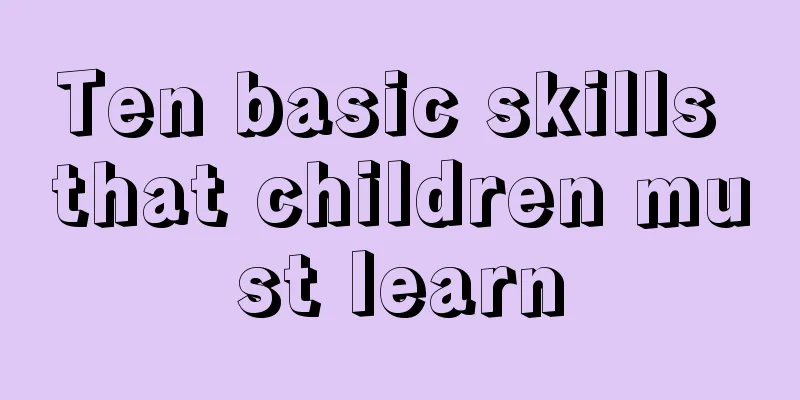Ten basic skills that children must learn

|
Many mothers love their children so much that they spoil them. They have to do or help their children with daily life skills such as eating, dressing, and going to the toilet. Some children don’t even know these basic life skills when they go to primary school! If you are such a mother, how long can you help your child? 1. Drink water from a cup Give your child a plastic or acrylic cup and let him or her learn to drink water from the cup. 2. Walking When a child moves with the help of something, stands on his own, and then takes steps to walk, his world becomes larger and richer. So after your baby learns to walk, try to let him walk by himself every time you go out, and avoid holding him or letting him sit in a stroller. Try to let him climb up and down stairs by himself. 3. Eat by yourself For children, eating by themselves is not just about eating, it is also a new and fun thing. Some parents feed their children themselves for fear that they will dirty the floor and clothes, depriving them of the opportunity to practice. In fact, letting children learn to feed themselves is more important than keeping tables, chairs and floors tidy and clean. Parents can put some paper or cloth on the floor and table to reduce the trouble of cleaning. They can also stand by their children, hold their hands and guide them to practice. 4. Wash your hands You can demonstrate to your child the process of washing your hands so that your child can learn and make connections. 5. Toilet training You can arrange for your child to sit on the toilet for a few minutes to get him used to it, and remind him to tell his parents when he needs to urinate or defecate. When the child first expresses the need to urinate or defecate, it is usually too late. Never scold or punish the child for his mistakes. When the child learns the movements to go to the toilet, give him affirmation and encouragement, and let the child feel that going to the toilet is a pleasant thing. 6. Put on and take off clothes and shoes When children are around two years old, they like to put on and take off their clothes and shoes by themselves. Prepare clothes and shoes that are easy to put on and take off for them, such as tops with simple buttons, pants or skirts with elastic bands, stick-on shoes, etc., and teach them the simple steps. 7. Brush your teeth You can start by buying a toothbrush with your baby. Usually, toiletries should be placed where children can easily reach them. At the beginning, adults can hold the child's hand to teach, the upper teeth from top to bottom, the lower teeth from bottom to top, inside and outside the same. Then rinse your mouth, dry it with a towel, finish the exercise, and put the utensils back in place. 8. Fold your clothes You can ask your children to help fold the collected clothes. After your child folds the clothes and puts them in the drawer, don’t forget to praise him. The child will do better and better. 9. Put away toys You can usually place toys in a fixed place at home, such as a storage box or appropriate place, which can serve as a home for the toys. When the child finishes playing with the toys, you can lead the child to the place where the toys are stored and tell the child that "the toys need to go home". Let the child put the toys back to the toy's home and cultivate the good habit of returning things to their original place. When your child finishes, remember to give positive and affirmative encouragement. 10. Express in words When children are young, they will express their needs by pulling, hugging, pointing or making other sounds. After one year old, parents should encourage their children to express their needs more verbally and provide them with opportunities to practice speaking. Parents can demonstrate how to speak complete sentences. When children can express their needs verbally and parents give appropriate interactions, the number of times children cry will decrease. Of course, it is still necessary to give moderate encouragement. |
<<: To create a high IQ baby, you need to pass 8 levels
>>: Children need to be alert to these 4 "high-risk personalities"
Recommend
How long can a baby's belly button be wet?
The baby's belly button is a very critical pa...
What should I do if my baby has nasal mucus?
The main reason why babies have nasal mucus is be...
What are the causes of bad breath in children?
I am a kindergarten teacher. Recently I found tha...
The dangers of obesity in children
Since the material foundation of many families ha...
Is it OK for children to have a midnight snack?
Many people don’t like to eat dinner and feel hun...
Height standard for 18-month-old baby
When many parents with children get together, wha...
How many times a day is normal for a baby to poop?
The birth of a baby brings joy to countless famil...
Is it normal for a newborn to snore?
Snoring has another alias, which is snoring. Norm...
What are some ways to cultivate self-discipline in children?
During the growth of our children, we parents wil...
What food should children eat when they have diarrhea? Recommended by authoritative experts!
Diarrhea in adults is usually not considered a se...
What is the reason for redness and pain on girls’ vulva?
It is not difficult to find that children are mat...
What to do if your baby is underdeveloped
After the baby is born, it is the time when paren...
How to treat red pimples on babies
Generally speaking, in the hot summer, we often f...
What should I do if my baby coughs and has eye mucus?
For some babies, there may be a lot of eye mucus....
What should I do if my two-month-old child is constipated?
Some babies may have constipation, especially whe...









